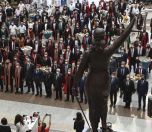* Photo: Pexels
Click to read the article in Turkish / Kurdish
The European Court of Human Rights (ECtHR) has finalized the application of imam Resul Üçdağ from Turkey's Kurdish-majority southeastern province of Diyarbakır, who was sentenced to prison in 2017 due to the two pictures that he had shared on Facebook.
The ECtHR has concluded that the related prison sentence violated freedom of expression. Resul Üçdağ will be paid 5,000 Euro in non-pecuniary damages and 1,736 Euro for the court expenses.
He shared the picture of protestors
Working as an imam in a mosque in Diyarbakır's Sur, Resul Üçdağ faced an investigation in June 2016. He was charged with "propagandizing for the Kurdistan Workers' Party (PKK)" over the two pictures that he had shared on social networking site Facebook in 2015 and 2016. The prosecutor's office alleged that imam Üçdağ "praised the violent practices of the PKK."
According to the file, there was a fire set by protestors in one of the pictures over which imam Resul Üçdağ faced praise charges. In the second picture, there were two People's Protection Units (YPG) members standing in front of the buildings that collapsed in the war.
Üçdağ stood trial over these pictures. The Diyarbakır 5th Heavy Penal Court found him guilty of the offense charged in 2017 and ruled that he should be sentenced to 1 year, 6 months, 22 days in prison. The prison sentence was deferred. As his appeals to this court ruling were rejected, Üçdağ made an application to the European Court of Human Rights (ECtHR).
In his application to the ECtHR, imam Resul Üçdağ indicated that his conviction was in violation of freedom of expression.
'Not certain why the pictures considered a crime'
In its judgement dated September 1, the ECtHR has noted that the pictures brought as criminal evidence against Üçdağ were shared by other Facebook users as well. It has also indicated that there was not sufficient information as to why the pictures were considered a crime by the court.
The ECtHR has added that the court did not offer any explanation regarding how Üçdağ praised violence with the related social media posts, thereby concluding that the conviction did not meet the criteria that would suffice to restrict freedom of expression in a democratic society. (AS/SD)












